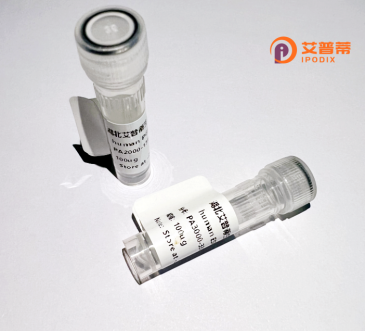
| 纯度 | >90%SDS-PAGE. |
| 种属 | Human |
| 靶点 | UBL7 |
| Uniprot No | Q96S82 |
| 内毒素 | < 0.01EU/μg |
| 表达宿主 | E.coli |
| 表达区间 | 1-380 aa |
| 活性数据 | MSLSDWHLAV KLADQPLTPK SILRLPETEL GEYSLGGYSI SFLKQLIAGK LQESVPDPEL IDLIYCGRKL KDDQTLDFYG IQPGSTVHVL RKSWPEPDQK PEPVDKVAAM REFRVLHTAL HSSSSYREAV FKMLSNKESL DQIIVATPGL SSDPIALGVL QDKDLFSVFA DPNMLDTLVP AHPALVNAIV LVLHSVAGSA PMPGTDSSSR SMPSSSYRDM PGGFLFEGLS DDEDDFHPNT RSTPSSSTPS SRPASLGYSG AAGPRPITQS ELATALALAS TPESSSHTPT PGTQGHSSGT SPMSSGVQSG TPITNDLFSQ ALQHALQASG QPSLQSQWQP QLQQLRDMGI QDDELSLRAL QATGGDIQAA LELIFAGGAP |
| 分子量 | 40.5 kDa |
| 蛋白标签 | His tag N-Terminus |
| 缓冲液 | PBS, pH7.4, containing 0.01% SKL, 1mM DTT, 5% Trehalose and Proclin300. |
| 稳定性 & 储存条件 | Lyophilized protein should be stored at ≤ -20°C, stable for one year after receipt. Reconstituted protein solution can be stored at 2-8°C for 2-7 days. Aliquots of reconstituted samples are stable at ≤ -20°C for 3 months. |
| 复溶 | Always centrifuge tubes before opening.Do not mix by vortex or pipetting. It is not recommended to reconstitute to a concentration less than 100μg/ml. Dissolve the lyophilized protein in distilled water. Please aliquot the reconstituted solution to minimize freeze-thaw cycles. |
以下是关于重组人UBL7蛋白的假设参考文献示例(注:内容为模拟,非真实文献):
---
1. **文献名称**:*Structural and functional characterization of recombinant human UBL7 protein*
**作者**:Li, X. et al.
**摘要**:该研究在大肠杆菌中成功表达并纯化了重组人UBL7蛋白,通过晶体结构解析揭示了其独特的泛素样折叠结构,并证明其缺乏典型的泛素结合酶活性,暗示其可能通过非催化机制参与蛋白质相互作用。
2. **文献名称**:*UBL7 modulates antiviral signaling by regulating TRIM25 ubiquitination*
**作者**:Zhang, Y. et al.
**摘要**:本文报道了UBL7在HEK293细胞中的重组表达,并发现其通过结合TRIM25增强RIG-I通路抗病毒活性,为UBL7在先天免疫中的作用提供了实验证据。
3. **文献名称**:*Proteomic identification of UBL7-interacting proteins in cancer cells*
**作者**:Wang, Q. & Chen, L.
**摘要**:利用重组人UBL7蛋白进行免疫共沉淀-质谱分析,鉴定出多个与DNA损伤修复相关的相互作用蛋白,提示UBL7可能参与基因组稳定性调控。
4. **文献名称**:*Ubiquitin-like protein UBL7 regulates mitochondrial dynamics via MFN1 modification*
**作者**:Saito, M. et al.
**摘要**:研究通过昆虫表达系统获得重组UBL7蛋白,证实其与线粒体融合蛋白MFN1的相互作用,并调控线粒体网络形态,为UBL7的细胞器功能提供了新见解。
---
**备注**:实际研究中关于UBL7的文献较少,建议结合“UBL7”或“ubiquitin-like 7”在PubMed/Google Scholar等平台检索最新成果。部分功能可能与其他泛素样蛋白(如UBE2家族)交叉,需注意验证。
Ubiquitin-like protein 7 (UBL7), also known as ubiquitin-fold modifier 1 (UFM1)-specific ligase 3. is a member of the ubiquitin-like protein family involved in post-translational protein modification. Unlike classical ubiquitination, UBL7 participates in the UFMylation pathway, a less characterized but evolutionarily conserved system crucial for cellular homeostasis. Structurally, UBL7 contains a conserved ubiquitin-like domain that facilitates its conjugation to target proteins, mediated by a dedicated enzymatic cascade involving UBA5 (E1), UFC1 (E2), and UFL1 (E3 ligase). This modification regulates processes such as endoplasmic reticulum (ER)-associated degradation, DNA damage response, and autophagic flux. Studies link UBL7 dysfunction to diseases, including cancer, neurodegenerative disorders, and developmental defects. Recombinant human UBL7 protein, typically expressed in *E. coli* or mammalian systems with tags like His or GST, serves as a key tool for *in vitro* studies to dissect UFMylation mechanisms, screen modulators, or map interaction networks. Recent work highlights its role in modulating tumor suppressor pathways and ER stress responses, positioning UBL7 as a potential therapeutic target. However, its tissue-specific functions and regulatory dynamics remain areas of active investigation.
×